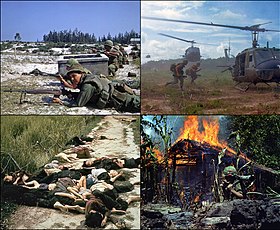The Vietnam War, also known as the Second Indochina War, was a prolonged conflict that took place from 1955 to 1975. It was fought between North Vietnam, supported by the Soviet Union and China, and South Vietnam, backed by the United States and its allies. The war left a lasting impact on the nations involved and the international community. This article aims to provide an overview of the Vietnam War, its causes, major events, and consequences.
The root causes of the Vietnam War can be traced back to the post-World War II era when Vietnam, a former French colony, was divided into two separate nations: communist North Vietnam and anti-communist South Vietnam. The political divide between these two regions eventually led to armed conflict. The United States became involved due to its policy of containment to prevent the spread of communism.
- Gulf of Tonkin Incident (1964): This incident, where American warships were allegedly attacked by North Vietnamese forces, led to increased U.S. military involvement in Vietnam.
- The surprise offensive by the North Vietnamese and Viet Cong forces during the Vietnamese New Year had a significant psychological impact and marked a turning point in public opinion regarding the war.
- The shocking revelation of the mass killing of unarmed South Vietnamese civilians by American soldiers caused outrage and further fueled anti-war sentiments.
- The peace agreement signed in Paris aimed to end the conflict, leading to the withdrawal of U.S. troops from Vietnam.
- North Vietnamese forces captured the South Vietnamese capital, Saigon, leading to the reunification of Vietnam under communist rule.
- The Vietnam War resulted in a high number of casualties, estimated at millions of lives lost, including soldiers and civilians from both sides. The conflict also led to significant infrastructure damage and the use of chemical weapons such as Agent Orange.
- The Vietnam War sparked a massive anti-war movement in the United States and other parts of the world. Protests, demonstrations, and draft resistance became prominent features of the era.
- Many Vietnam War veterans faced physical and psychological challenges upon returning home. The lack of support and the stigma surrounding the war created lasting effects on their lives.
- The Vietnam War had significant geopolitical consequences. It strained relations between the United States and the Soviet Union, China, and other communist nations. Additionally, it led to a shift in U.S. foreign policy towards a more cautious approach.
- Following the war, Vietnam experienced a difficult period of reconstruction and transition. The country underwent economic reforms and gradually opened up to foreign investment, leading to its current status as a rapidly developing nation.
The Vietnam War remains a pivotal event in world history, shaped by political ideologies, military strategies, and the profound impact on the nations involved. Its legacy serves as a reminder of the consequences of armed conflicts and the importance of diplomatic solutions. As we reflect on this period, it is crucial to learn from the mistakes made and strive for peaceful resolutions to global conflicts



















Add Comment